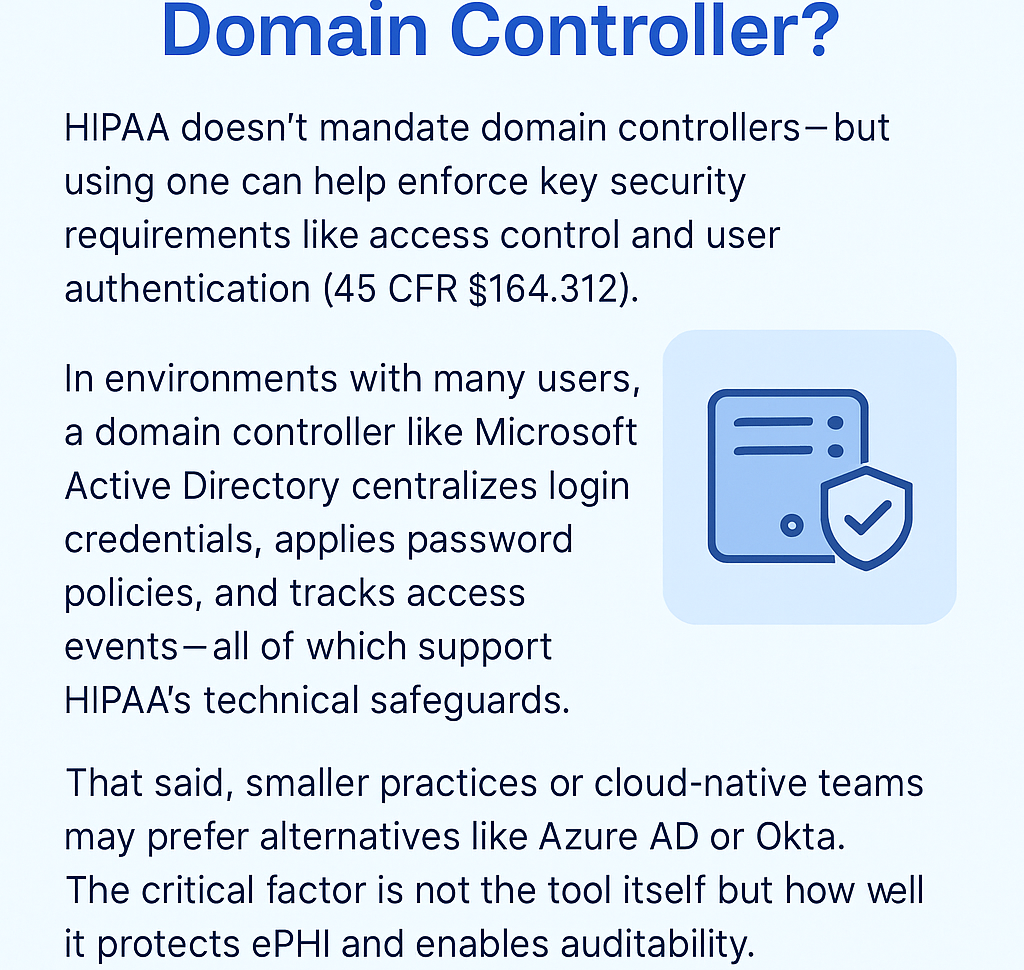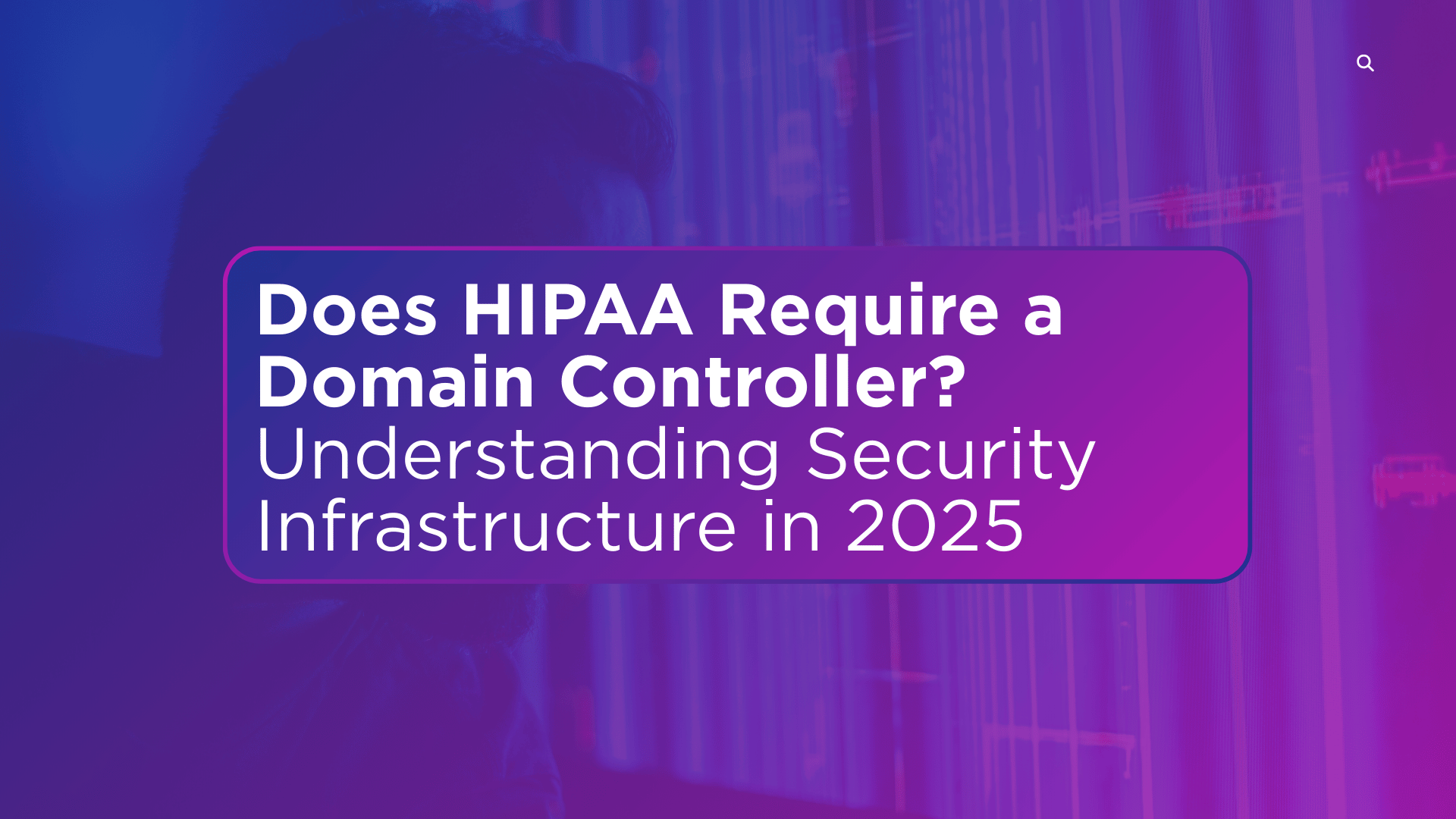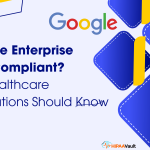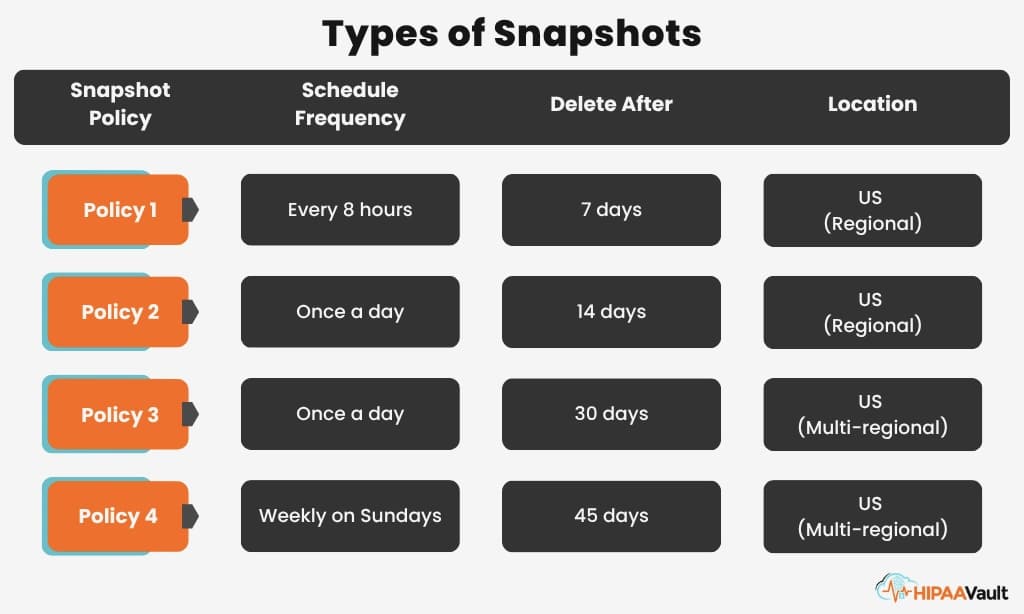Healthcare IT leaders often face a critical question: does HIPAA require a domain controller? As organizations move toward fully digital environments, managing user identities and system access becomes essential to security and compliance. The confusion usually lies in whether HIPAA demands specific technologies—or just outcomes that ensure patient data remains protected.
Need HIPAA-compliant infrastructure that handles access control for you? Learn more
—
Introduction: HIPAA Compliance and Infrastructure
HIPAA doesn’t operate like a product manual. It never lists technologies by name, and it certainly doesn’t tell IT professionals which server roles to deploy. Yet, its requirements are strict. When handling protected health information (PHI), covered entities and their partners must implement “technical safeguards” to prevent unauthorized access.
A domain controller—used in systems like Microsoft Active Directory—helps manage authentication, access rights, and user sessions. In other words, it can play a critical role in enforcing those HIPAA safeguards. But is it required?
The short answer: no, a domain controller is not specifically required by HIPAA. The long answer: systems that replicate its functions are mandatory.
Non-compliance with the HIPAA Security Rule can result in substantial penalties, reputational damage, and increased audit risk. That’s why the architecture you choose matters.
Want a trusted team to manage your secure environment? Get a HIPAA infrastructure consultation →
—
What Is a Domain Controller and Why It Matters
A domain controller is a server that responds to authentication requests and enforces security policies within a network. In healthcare, this often supports centralized login systems, password policies, session timeouts, and permission-based access to PHI.
Without it—or without something equivalent—IT teams may lack the visibility and control needed to restrict unauthorized data access. For HIPAA-regulated environments, that’s a deal-breaker.
Whether you use Microsoft Active Directory, Azure AD, or a Linux-based LDAP solution, the core function remains the same: restrict access to sensitive systems based on user identity.
HIPAA doesn’t mandate which software achieves this. But it does require that access to PHI is both limited and logged.
—
Does HIPAA Require a Domain Controller?
No, HIPAA does not mention domain controllers explicitly. What it does require is codified in 45 CFR §164.312, the portion of the Security Rule focused on technical safeguards.
This section includes required elements like access control, audit controls, person or entity authentication, and transmission security. How you implement these is left to your organization—so long as the protections are reasonable and appropriate based on your environment.
A domain controller is one of the most efficient ways to meet these safeguards, particularly for larger practices or those using on-premises systems. However, HIPAA is technology-agnostic. You can meet the same requirements using cloud identity platforms, managed directory services, or custom access tools.
What matters is proving that your access controls are enforced—and that access is limited to the right people at the right time.
Read the official HHS guidance here: https://www.hhs.gov/hipaa/for-professionals/security/index.html

HIPAA-Compliant Access Control: What’s Required
HIPAA expects healthcare organizations to ensure that PHI access is tightly restricted. According to the Security Rule:
Access must be based on each user’s role.
Users must have unique logins.
Systems should have automatic logout or session expiration.
Administrators must be able to track who accessed what and when.
Whether you achieve this with a domain controller, an SSO platform, or a cloud-hosted identity service is up to you. But it must be done.
Need help setting up secure access controls for your healthcare network? Get HIPAA Vault’s managed hosting
—
How HIPAA Vault Supports Secure Infrastructure
HIPAA Vault offers secure, compliant hosting environments with built-in access control options. Whether you’re migrating from a traditional Windows server or building a new web platform, our environments are hardened for compliance from day one.
We support Linux and Windows hosting with strict user access controls, audit-ready logging, encrypted login sessions, and 24/7 system monitoring.
Our clients receive customized deployment support, including Active Directory integration or lightweight alternatives—depending on scale and need. We sign Business Associate Agreements (BAAs) with full transparency and configure systems to match the requirements outlined in 45 CFR §164.312.
You don’t have to manage domain controllers on your own. Let HIPAA Vault take care of it—so you can focus on care, not compliance.
—
Final Thoughts: Is a Domain Controller Necessary?
HIPAA doesn’t require a domain controller—but it does require access control. In most healthcare environments, domain controllers are a fast, secure, and scalable way to meet that need. They’re especially useful for larger groups, hybrid cloud setups, and organizations with a broad user base.
But they’re not your only option.
If you’re using cloud-first platforms, identity management can be achieved through SSO and integrated access tools. What’s important is that you’re documenting, enforcing, and monitoring who accesses PHI—and how.
HIPAA Vault can help you build this system, manage it 24/7, and ensure you remain compliant as your infrastructure evolves.
Talk to a HIPAA infrastructure expert now
—
HIPAA Penetration Testing—Go Beyond Automated Scans
Validate your security with an objective, third-party audit. We simulate real cyberattacks to uncover vulnerabilities and provide a comprehensive compliance report.
Learn MoreFAQs
Q: Does HIPAA require a domain controller?
A: No. HIPAA requires technical safeguards for access control, but it does not name specific technologies. A domain controller is one way to meet those requirements, not the only way.
Q: Can I use Active Directory in a HIPAA-compliant environment?
A: Yes, Active Directory is commonly used to manage access to PHI in HIPAA environments. It must be properly secured, monitored, and paired with encryption and audit logging.
Q: What if I don’t have internal IT staff to manage a domain controller?
A: Consider managed hosting solutions like HIPAA Vault. We offer domain controller alternatives and help you meet HIPAA’s requirements without the operational burden.








